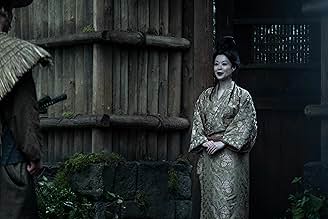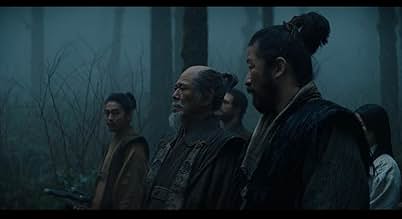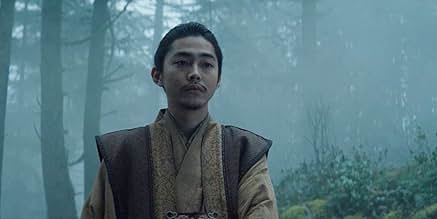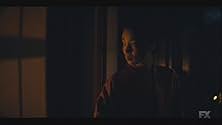Outplayed by new alliances in Osaka, Toranaga is forced to carve out a new deal with a long lost family member.Outplayed by new alliances in Osaka, Toranaga is forced to carve out a new deal with a long lost family member.Outplayed by new alliances in Osaka, Toranaga is forced to carve out a new deal with a long lost family member.
Ryo Hayashida
- Tough Green Samurai
- (as Ryohei Hayashida)
Featured reviews
This was a dark, dire episode that does a great job of setting up tension with the nerve jangling music, the grey-and-green pallete, the misty deep forests that seem to be clothed in perpetual night.
We also get more insight into the characters, not just the big three, and hear about their hopes and fears and perspectives on what is happening. Yabushige's nephew seems to be on a collision course with Toranaga now, as Buntaro is on a collision course with Blackthorne.
The details of this episode are very Game of Thrones-y. That's all I'll say, to avoid spoilers.
At the end, Blackthorne seems poised for a different journey that diverges from the one Toranaga and his clan are on. But since they're in the same story, we can be assured their paths will cross again, probably in the next episode.
We also get more insight into the characters, not just the big three, and hear about their hopes and fears and perspectives on what is happening. Yabushige's nephew seems to be on a collision course with Toranaga now, as Buntaro is on a collision course with Blackthorne.
The details of this episode are very Game of Thrones-y. That's all I'll say, to avoid spoilers.
At the end, Blackthorne seems poised for a different journey that diverges from the one Toranaga and his clan are on. But since they're in the same story, we can be assured their paths will cross again, probably in the next episode.
A Stick of Time, a new episode of Shogun, opens after a bloody battle, showcasing the show's unflinching portrayal of feudal carnage. The scene features battered corpses and close-up beheadings, but the viewer may feel let down when a man shouts "The war is over!" The show then reveals that the scene is the aftermath of Toranaga's first battle 46 years prior. The young warrior accepts his enemy's surrender and assists him with his seppuku. Toranaga's political maneuvers have been observed since Shogun's pilot episode, and this scene is possibly the most revealing of his character. Toranaga, a man with strong warrior instincts, seeks to make amends with his long-lost brother, Lord Saeki, but their rift is not due to lingering resentment. After a good-natured ribbing, Toranaga and Lord Saeki decide to let bygones be bygones. Toranaga still dislikes his "mongrel half-brother" and uses a tactic to win him over, using top-tier prostitutes. The Anjin is curious about his role in the Crimson Sky plan, but Blackthorne isn't shocked when Toranaga declines to divulge details. The exchange contributes to the mounting friction between these uneasy allies, as Toranaga has never been one to post his plans on a billboard. The Anjin's uneasy allies are influenced by the Anjin's refusal to disclose details, highlighting the tension between their uneasy allies. Omi, upset that Saeki is taking up Kiku's time, redirects his anger to Blackthorne, accusing him of soiling Gin's tea house. Gin, unperturbed, suggests Kiku is infatuated with someone else. The show's dynamic female character, Fuji, embodies the best traits of Toranaga, Blackthorne, and Mariko, providing the clearest thematic link between their storylines. Fuji's conflicting emotions remind us that she shares Blackthorne's courage and Toranaga's commitment to duty, while also possessing Mariko's knowledge of the futility of it all. Saeki publicly disrespects Toranaga, leading to an act of betrayal that makes a story of childhood incontinence look like kids' stuff. His official reasons for betraying his brother and nephew to the Council of Regents might be political, but it's clear that he was primarily motivated by old-fashioned sibling rivalry. Yabushige, who has been playing both sides of the fence, is also uncertain about his allegiances. Gin's wisdom and entrepreneurial ambition come to the fore as she shares her vision of a brighter future in which courtesans are unionized and allowed to work together in a centralized brothel district.
As a big fan of the book, I was concerned going into this. James Clavell's vision is so immersive, so precise, I didn't think the creators would pull off a faithful adaptation. Yet somehow, they did. I know Star Wars fans will see the word "somehow" and immediately downvote my review before reading the rest, but I can't help it. Magic can't be explained in the case of Shogun. It is one of the rawest and purest depiction of the time period I've personally seen on screen, and that is owed in no small part to the genius that is Hiroyuki Sanada. His involvement elevates this project to unspeakable heights. I know it sounds like I'm exaggerating, but this show has brought me so much joy. We are but a few episodes away from the finale but I can't forsee even the slightest dip in quality, because it's clear that Rachel Kondo and Justin Marks respect the source material but also have tremendous passion for the story they're telling. I'll admit that I'm bitter - Game of Thrones broke my heart. I've witnessed what happens when you stray from the source material and let your ego guide you. Thankfully, that isn't the case with Shogun. It saddens me that we won't get a season two, just because of how brilliant this gem of a show is. But hats off to both creators for respecting their audience's time. As it is now, Shogun is perfect to me and I have no doubt they'll stick the landing. It's a great year for TV...
First off, let's talk about the new player in town: Toranaga's brother. I was immediately intrigued by his arrival, and the way the episode builds up his presence before we even meet him is masterful. We've heard whispers of his influence and the potential threat he poses, so when he finally steps onto the stage, it feels like a momentous occasion. His interactions with Toranaga are fascinating to watch, as they're steeped in both familial tension and political calculation. The dynamic between the two brothers is a fresh and compelling addition to the series.
The stakes feel higher than ever, and there's a real sense of danger lurking beneath the surface. Toranaga's maneuvering, as he tries to anticipate and outmaneuver not just his brother, but also his other rivals, is brilliant to watch. It's like a high-stakes game of chess where every move counts, and one wrong step could lead to disaster. The tension is palpable, and I found myself on the edge of my seat, trying to predict who would come out on top.
The ending of the episode is particularly well-executed. Without giving too much away, let's just say that the final moments are both shocking and satisfying. There's a sense that the carefully laid plans of several characters are starting to unravel, and the consequences are going to be dire. The way the episode builds up to this climax is masterful, and the payoff is worth the wait. It's one of those endings that leaves you with your jaw on the floor, eager to see what happens next. I have to give credit to the writers and directors for pulling off such a tense and impactful conclusion. It's the kind of ending that reminds you why you're invested in the story and its characters in the first place.
However, as much as I enjoyed the episode, it's not without its flaws. The pacing, while generally good, does drag in certain parts. There are a few scenes that feel more like filler than necessary plot development, particularly some of the extended sequences with Anjin. Don't get me wrong, I appreciate the character-building moments, but there are times when it feels like the story is treading water instead of moving forward. Anjin's journey is important, and I understand the need to show his growing integration into Japanese society, but some of these scenes could have been trimmed down to keep the momentum going.
That said, these weaknesses don't overshadow the strengths of the episode. The arrival of Zataki adds a new layer of complexity to the story, and the political chess game between the brothers is gripping to watch. Overall, Episode 7 is a strong installment that successfully raises the tension and sets the stage for the conflicts to come.
The stakes feel higher than ever, and there's a real sense of danger lurking beneath the surface. Toranaga's maneuvering, as he tries to anticipate and outmaneuver not just his brother, but also his other rivals, is brilliant to watch. It's like a high-stakes game of chess where every move counts, and one wrong step could lead to disaster. The tension is palpable, and I found myself on the edge of my seat, trying to predict who would come out on top.
The ending of the episode is particularly well-executed. Without giving too much away, let's just say that the final moments are both shocking and satisfying. There's a sense that the carefully laid plans of several characters are starting to unravel, and the consequences are going to be dire. The way the episode builds up to this climax is masterful, and the payoff is worth the wait. It's one of those endings that leaves you with your jaw on the floor, eager to see what happens next. I have to give credit to the writers and directors for pulling off such a tense and impactful conclusion. It's the kind of ending that reminds you why you're invested in the story and its characters in the first place.
However, as much as I enjoyed the episode, it's not without its flaws. The pacing, while generally good, does drag in certain parts. There are a few scenes that feel more like filler than necessary plot development, particularly some of the extended sequences with Anjin. Don't get me wrong, I appreciate the character-building moments, but there are times when it feels like the story is treading water instead of moving forward. Anjin's journey is important, and I understand the need to show his growing integration into Japanese society, but some of these scenes could have been trimmed down to keep the momentum going.
That said, these weaknesses don't overshadow the strengths of the episode. The arrival of Zataki adds a new layer of complexity to the story, and the political chess game between the brothers is gripping to watch. Overall, Episode 7 is a strong installment that successfully raises the tension and sets the stage for the conflicts to come.
Episode 7 of Shogun, titled "A Stick of Time," continues the tense cultural and political conflicts at the heart of this saga. The episode centers on the growing clash between John Blackthorne (Richard Chamberlain) and the rigid traditions of Japan, as well as the continued maneuvering of Lord Toranaga (Toshiro Mifune) in his quest for power. In this installment, Blackthorne's deepening relationship with Japanese society faces a new test as he grapples with the samurai code of honor, while the ever-shifting political alliances around him further complicate his already precarious position.
The episode begins with Blackthorne's continued struggle to adapt to Japanese customs, particularly as he is forced to navigate the complex system of hierarchy and loyalty. The central conflict of the episode revolves around a test of Blackthorne's allegiance, as Lord Toranaga puts him in situations that challenge his understanding of honor, duty, and survival. Chamberlain delivers a compelling performance, balancing Blackthorne's growing respect for Japanese culture with his own inherent desire for autonomy and freedom. This internal conflict is highlighted in several key scenes, particularly one in which Blackthorne is forced to confront his feelings of superiority as a European, a theme that has been subtly present throughout the series but is more overtly examined in this episode.
One of the strengths of "A Stick of Time" is its portrayal of the political intrigue surrounding Lord Toranaga. Toshiro Mifune's performance continues to be a highlight, as he expertly conveys the cunning and strategic mind of a leader who is always thinking several steps ahead of his enemies. Toranaga's manipulation of both his allies and adversaries reaches new heights in this episode, with the viewer gaining deeper insight into his long-term goals. The scenes between Toranaga and Blackthorne are particularly well-written, filled with tension and subtle power plays, as Toranaga's mentorship of the foreigner serves both personal and political purposes. Mifune's understated but commanding presence keeps the audience engaged, and his ability to convey so much with so little dialogue is a testament to his skill as an actor.
Visually, "A Stick of Time" maintains the series' high standard of production design and cinematography. The episode is beautifully shot, with the natural landscapes of Japan providing a stunning backdrop to the drama. The use of wide shots to capture the vastness of the Japanese countryside, contrasted with the more intimate, close-up shots of the characters' faces, highlights the personal stakes of the story while also emphasizing the broader cultural and political landscape. The costuming, particularly the intricate samurai armor and the colorful kimonos worn by the women, continues to be a visual feast, grounding the series in historical authenticity while also adding a layer of visual storytelling.
However, despite its many strengths, the episode does suffer from some pacing issues. While the political intrigue and character development are compelling, there are moments where the narrative slows down, particularly in scenes that focus too heavily on exposition. While these moments are necessary to fully understand the complexities of the story, they occasionally feel drawn out and disrupt the overall flow of the episode. This is particularly noticeable in the scenes that involve discussions of military strategy and political alliances, which, while important to the plot, could have been more tightly edited to maintain the episode's momentum.
The supporting cast also delivers strong performances, particularly Yoko Shimada as Mariko, whose loyalty to both Blackthorne and Toranaga becomes increasingly complicated as the political stakes rise. Mariko's internal struggle is one of the most compelling elements of the episode, as she is torn between her duty to her lord and her growing affection for Blackthorne. Shimada's portrayal of Mariko's quiet strength and emotional turmoil adds depth to the character, making her one of the most multifaceted figures in the series. Her interactions with Blackthorne in this episode are particularly poignant, as their relationship is tested by the external pressures of their respective loyalties.
In conclusion, "A Stick of Time" is a well-crafted episode that continues to build on the complex political and cultural dynamics that have made Shogun such a compelling series. The performances, particularly by Chamberlain and Mifune, are exceptional, and the episode's exploration of themes like honor, loyalty, and cultural adaptation adds depth to the narrative. While the pacing may falter at times, the episode's strong character development and stunning visuals more than make up for these minor shortcomings. As the series progresses, it becomes clear that Shogun is not just a tale of adventure and survival, but a profound exploration of the clash between cultures and the personal transformations that occur as a result.
The episode begins with Blackthorne's continued struggle to adapt to Japanese customs, particularly as he is forced to navigate the complex system of hierarchy and loyalty. The central conflict of the episode revolves around a test of Blackthorne's allegiance, as Lord Toranaga puts him in situations that challenge his understanding of honor, duty, and survival. Chamberlain delivers a compelling performance, balancing Blackthorne's growing respect for Japanese culture with his own inherent desire for autonomy and freedom. This internal conflict is highlighted in several key scenes, particularly one in which Blackthorne is forced to confront his feelings of superiority as a European, a theme that has been subtly present throughout the series but is more overtly examined in this episode.
One of the strengths of "A Stick of Time" is its portrayal of the political intrigue surrounding Lord Toranaga. Toshiro Mifune's performance continues to be a highlight, as he expertly conveys the cunning and strategic mind of a leader who is always thinking several steps ahead of his enemies. Toranaga's manipulation of both his allies and adversaries reaches new heights in this episode, with the viewer gaining deeper insight into his long-term goals. The scenes between Toranaga and Blackthorne are particularly well-written, filled with tension and subtle power plays, as Toranaga's mentorship of the foreigner serves both personal and political purposes. Mifune's understated but commanding presence keeps the audience engaged, and his ability to convey so much with so little dialogue is a testament to his skill as an actor.
Visually, "A Stick of Time" maintains the series' high standard of production design and cinematography. The episode is beautifully shot, with the natural landscapes of Japan providing a stunning backdrop to the drama. The use of wide shots to capture the vastness of the Japanese countryside, contrasted with the more intimate, close-up shots of the characters' faces, highlights the personal stakes of the story while also emphasizing the broader cultural and political landscape. The costuming, particularly the intricate samurai armor and the colorful kimonos worn by the women, continues to be a visual feast, grounding the series in historical authenticity while also adding a layer of visual storytelling.
However, despite its many strengths, the episode does suffer from some pacing issues. While the political intrigue and character development are compelling, there are moments where the narrative slows down, particularly in scenes that focus too heavily on exposition. While these moments are necessary to fully understand the complexities of the story, they occasionally feel drawn out and disrupt the overall flow of the episode. This is particularly noticeable in the scenes that involve discussions of military strategy and political alliances, which, while important to the plot, could have been more tightly edited to maintain the episode's momentum.
The supporting cast also delivers strong performances, particularly Yoko Shimada as Mariko, whose loyalty to both Blackthorne and Toranaga becomes increasingly complicated as the political stakes rise. Mariko's internal struggle is one of the most compelling elements of the episode, as she is torn between her duty to her lord and her growing affection for Blackthorne. Shimada's portrayal of Mariko's quiet strength and emotional turmoil adds depth to the character, making her one of the most multifaceted figures in the series. Her interactions with Blackthorne in this episode are particularly poignant, as their relationship is tested by the external pressures of their respective loyalties.
In conclusion, "A Stick of Time" is a well-crafted episode that continues to build on the complex political and cultural dynamics that have made Shogun such a compelling series. The performances, particularly by Chamberlain and Mifune, are exceptional, and the episode's exploration of themes like honor, loyalty, and cultural adaptation adds depth to the narrative. While the pacing may falter at times, the episode's strong character development and stunning visuals more than make up for these minor shortcomings. As the series progresses, it becomes clear that Shogun is not just a tale of adventure and survival, but a profound exploration of the clash between cultures and the personal transformations that occur as a result.
Did you know
- TriviaA ri is a Japanese unit of measurement that is about 3.93 kilometers, or 2.44 miles. It is defined as the distance a person can walk in an hour at a reasonable pace.
- Quotes
Yoshii Toranaga: Why is it that only those who have never fought in a battle are so eager to be in one?
- SoundtracksThe Pull of Death
performed by Atticus Ross, Leopold Ross & Nick Chuba
Details
- Runtime55 minutes
- Color
- Sound mix
- Aspect ratio
- 2.00 : 1
Contribute to this page
Suggest an edit or add missing content






















